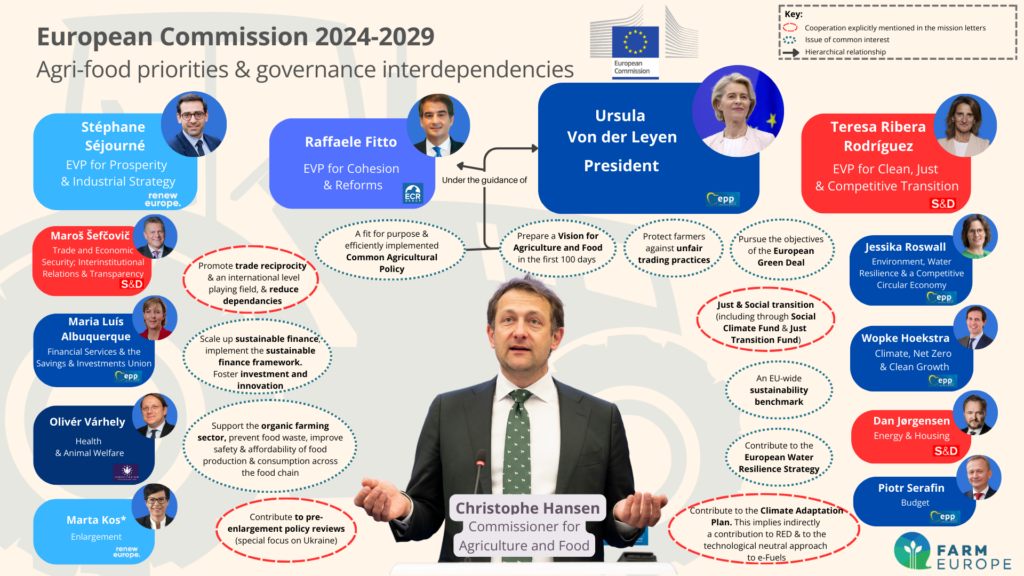Over the last five years, conflicting messages sent by regulators have been one of the main challenges for the agricultural community, and for the credibility of the policy path at European level. The assessment of the mission letters given by President Von der Leyen to Commissioner-designate for Agriculture and Food, Christophe Hansen and to other members of the college, shows that ensuring consistency and coherence will remain one of the main challenge of the new Commissioner, who will need to cooperate closely with more than 12 of his colleagues to deliver on the agricultural priorities of the new college.
An overview of the 12 Herculean tasks facing the new Commissioner-designate for Agriculture.

1- The most pressing file that the future commissioner will have to address during the first 100 days of his mandate is the elaboration of a Vision for Agriculture and Food, with the aim of ensuring the “long-term competitiveness and sustainability of [the] farming and food sector”, which will most likely occur under the close supervision of both Ursula Von der Leyen and Raffaele Fitto.
2- A second challenge, closely associated with the previous one, relates to granting an effective and forward-looking implementation of the Common Agricultural Policy, under the guidance of EVP Fitto, with the objective of providing adequate support to farmers and making sure that they receive sufficient revenues. This mission is directly linked to the ambition of having “thriving rural areas” all over Europe.
3- Another measure to protect the farmers’ community will be to work closely with the commissioner for Trade and Economic Security, Maroš Šefčovič, in order to “promote trade reciprocity and an international level playing field” as well as to reduce dependencies on foreign imports. Stéphane Séjourné, the French EVP for Prosperity and Industrial Strategy, is expected to keep a close eye on the matter.
4- On her side, EVP for Clean, Just and Competitive Transition will have to work with Mr Hansen to protect farmers against unfair trading practices.
5- Concerning one of the most sensitive aspects of the agricultural portfolio – investments – the Commissioner for Agriculture and Food will have to cooperate with the commissioner for Financial Services and Investments Unions to foster investment and innovation in the sector, especially by scaling up sustainable finance and “leveraging and de-risking private capital”. Indeed, the Commissioner in charge of agriculture will also have to work closely with his colleague in charge of the Budget, Piotr Serafin.
6- When it comes to resilience and sustainability, keywords in Christophe Hansen’s mission letter, he will work with the Commissioner for Health and Animal Welfare to “support the organic farming sector, prevent food waste, improve safety & affordability of food production & consumption across the food chain”.
7 & 8 – Together with commissioner Jessika Roswell and Wopke Hoekstra, and under the guidance of Ms Ribera, Hansen will pursue the objectives of the Green Deal, while realising an EU-wide sustainability benchmark of the agri-food sector, as suggested by the conclusions of the Strategic Dialogue.
9 & 10 – Their collaboration will also concern the preparation of a Climate Adaptation Plan, implying an indirect contribution to RED and to the technological neutral approach to e-Fuels, as well as the EU’s just and social transition (including the Social Climate Fund and the Just Transition Fund).
11- Finally, he will contribute to the European Water Resilience Strategy coordinated by the commissioner for Environment, Water Resilience and a Competitive Circular Economy.
12 – EU enlargement to Ukraine will be another central issue of the next Commission’s mandate, which also represents a high-stake challenge for the European agri-food sector. This will lead the agriculture commissioner to take part in pre-enlargement policy reviews together with future commissioner Marta Kos.
In sum, Christophe Hansen will have to draw on his political charisma, solid experience on agricultural issues and in-depth knowledge of European institutions in order to slaying the twelve-headed hydra which will be his upcoming mandate. However, the general character of several tasks listed in his mission letter leaves him a wide margin for manoeuvre to develop his own vision on the future of EU’s agriculture. In this light, the structure of the new European Commission represents a promising step forward to open a new chapter of European policy in the field of agriculture and food, under the condition that Mr Hansen is provided with the strong support from the Commission’s President and cooperative approach from his colleagues within the new college.